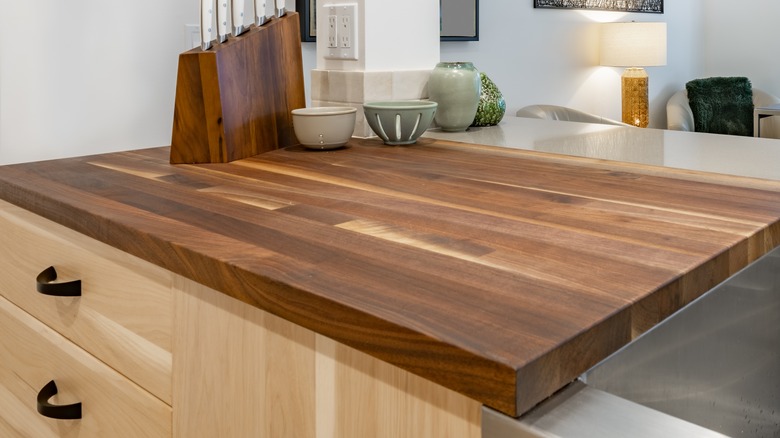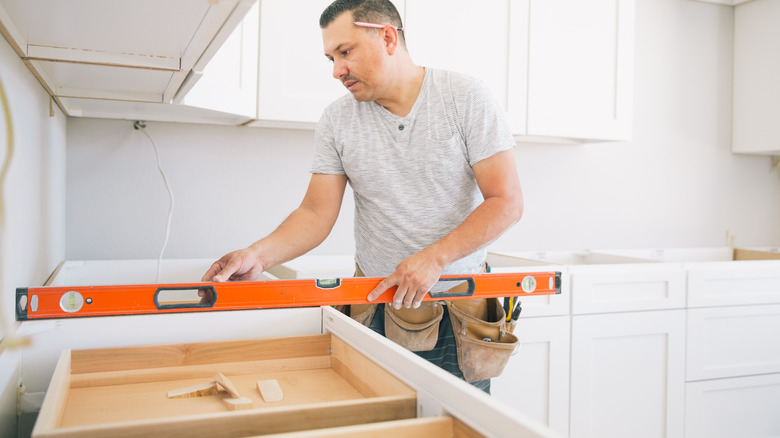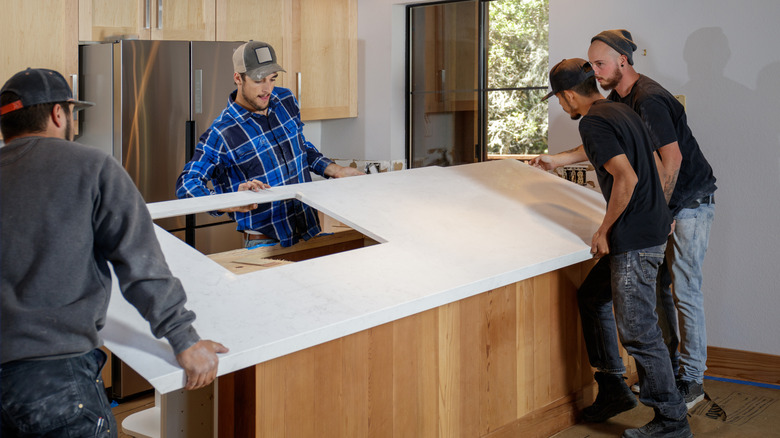Should You Attempt To DIY Install Butcher Block Countertops?
For those of us on a budget, DIY home improvement projects offer an opportunity to update our items or homes with fresh looks and new features — maybe even some increased functionality. It's tempting to want to cut corners on seemingly outrageously expensive services like professional installation in favor of upgrading to more luxe and costly materials. However, for the average DIY-er, some projects are simply too difficult to be done by an amateur. At the very least, hobbyists should have extensive experience to tackle some things on their own. One project in particular that's a little too much for non-professionals is installing butcher block counters.
Butcher block is an attractive update to any kitchen, bringing in a look that is both high-end and rustic while also being more damage-resistant. And because it's wood instead of a more intimidating material like quartz or granite, some weekend carpenters might consider it a safe material to work on solo. Unfortunately, there are many reasons why butcher block countertop installation is more than a one-man job.
Challenges to installing butcher block counters
Butcher block is a sturdy and stylish material for your kitchen countertops. It's also incredibly heavy. We're talking about several square feet of solid hardwood of at least 2 and as many as 12 inches thick. It can't be lifted by one person working alone. Two or three very strong helpers will be needed to lift and properly position the block in place.
Moreover, butcher block is sold in solid slabs and will need to be tooled and cut to fit the specific measurements of your kitchen, to fit your sink well, and to snugly lay against your appliances. In addition to this process requiring multiple people to handle the wood, it also requires several expensive power tools, not to mention advanced skill and experience using them. Even a seemingly minor mistake like reversing measurements can result in needing to reorder a whole new piece, something professional contractors might not charge for if the error is theirs. Working alone, there's no one to eat the cost of mistakes but yourself.
The cost of a professional may be cheaper in the long run
Whenever budgeting for renovation projects, it's important to factor in not only the costs of the materials but also the cost of the labor and installation. Because of this, people may decide to save money — possibly freeing up some of their budget for higher-end products — by turning their kitchen update into a DIY project. Unfortunately, even though it's technically "free" to do the labor yourself, it can still be quite expensive regarding additional time requirements, necessary tools, and potentially costly mistakes. For instance, whereas a professional contractor or installation company can install your new countertops in an afternoon, it will probably take an amateur working alone as many as two days. That's two days of having a non-working kitchen, necessitating every meal to be purchased, among various other inconveniences.
Not only that, but professionals already own the tools required for installation and have the necessary experience to use them correctly. DIY remodelers may have to buy new or better tools, running into the hundreds of dollars. And DIY-ers are more likely to make errors that can wind up costing hundreds if not thousands of dollars. Conversely, while a butcher block counter installation can cost anywhere from $5 to $15 per square foot, that may be a small price to pay to make sure your countertops are installed perfectly to fit your kitchen, leaving you free to enjoy them.


